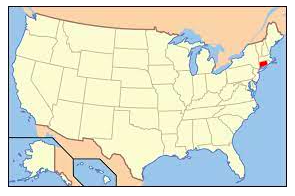Connecticut Legalizes Adult-Use Cannabis

By Diego Beltran
Edited by Bill Kearney
On June 22nd, 2021, after a hard-fought battle, Connecticut’s governor finally decided to sign Senate Bill 1201, which legalized adult-use recreational cannabis as well as to expunge thousands of past convictions for marijuana possession. With his signature, Connecticut became the 19th state to legalize recreational marijuana, and the fifth to do so this year following New Mexico, New York, Virginia, and New Jersey.
The recreational adult-use of marijuana will be legal in the state of Connecticut on July 1st, 2021, but retail sales are not expected until late 2022.
Social equity program
The legislation comes with an emphasis on racial, social, and economic justice, leaving a Social Equity Council in charge of defining and regulating how a legal marijuana market should become an instrument for the improvement of these affected communities.
In this sense, the governor and lawmakers have 30 days from passage of this law to make appointments to a council charged with promoting the participation of people from communities disproportionately affected by marijuana prohibition in the cannabis industry.
The council is expected to establish the criteria for a study of the historical and current consequences of marijuana prohibition before Labor Day, to make recommendations for establishing an equitable adult-use marijuana industry. By January 1, 2022 the council must use the results of the study to recommend legislation for implementing social equity policies.
For licensing purposes, social equity applicants are defined as those who are at least 65% owned and controlled by an individual who (i) had an average household income of less than 300% of the state median household income over the three years prior to the application, and (ii) was a resident of a disproportionately impacted area for at least five of the ten years prior to the application or was a resident of a disproportionately impacted area for not less than nine years prior to attaining the age of 18.
Sales tax
The governor claimed that, under the new bill, the tax rate would be lower than the one implemented in New York, but will be comparable to the one in Massachusetts.
Under the new legislation, retail sales will include a 3% municipal sales tax, which will be directed to the town or city where the retail sale occurred. This tax is in addition to the 6.35% state sales tax, and a tax based on the THC content of the product.
All the cannabis tax revenue will be deposited into the state’s General Fund for fiscal years 2022 and 2023. Most of the tax revenue will be allocated between a “Social Equity and Innovation Fund” and a “Prevention and Recovery Services Fund”.
Municipalities will be able to ban retail sales through zoning, and they will also be able to regulate public use. However, the bill explicitly bans smoking marijuana in state parks and on state waterways. It also expands all smoking prohibitions by prohibiting smoking at workplaces, including within 25 feet of an entrance, as well as barring hotels from offering smoking rooms.
Licensing
According to the new legislations, there will be nine types of licenses, namely:
- Retailer
- Hybrid retailer
- Cultivator
- Micro-cultivator
- Product manufacturer
- Food and beverage manufacturer
- Product packager
- Delivery service
- Transporter
The Connecticut Department of Consumer Protection said it was aiming to begin issuing licenses to grow and sell marijuana sometime in 2022. The department will establish the maximum number of licenses to be issued, as well as the maximum number of applications to be considered.
Half of all the Connecticut’s cannabis establishment licenses will be reserved for social equity applicants, which is a similar approach as the one taken in New York’s social equity program.
Application fees
As mentioned above, one half of the maximum number of applications will be reserved for Social Equity Applicants, which will be selected through a social equity lottery.
Non-social equity applicants must pay fees for the issuance or renewal of all licenses:
- Retailer, Hybrid Retailer and Product Packager applicants must pay an application fee of $500, a provisional license fee of $5,000 and a final licensing fee of $25,000. The renewal fee is of $25,000.
- Cultivator applicants must pay an application fee of $1,000, a provisional license fee of $25,000, and a final licensing fee of $75,000. The renewal fee is of $75,000.
- Micro-Cultivator applicants must pay an application fee of $250, a provisional license fee of $500, and a final licensing fee of $1,000. The renewal fee is of $1,000.
- Product Manufacturer applicants must pay an application fee of $750, a provisional license fee of $5,000, and a final licensing fee of $25,000. The renewal fee is of $25,000.
- Food and Beverage Manufacturer, and Delivery Services or Transporter applicants must pay an application fee of $250, a provisional license fee of $1,000 and a final licensing fee of $5,000. The renewal fee is of $5,000.
Social equity applicants are eligible for a 50% licensing-fee reduction for the initial application and for the first three renewal cycles. Further, each licensed producer will be required to contribute $500,000 to the council for a program to help social equity applicants open micro-cultivator establishments.
If the Department receives more applications for any license type than the maximum number to be considered, a lottery will be conducted to identify the applications for review. Effective dates for all provisions of the new legislation vary and may be tied to additional action from state regulators.
To navigate through the cannabis industry, it is imperative to seek an expert’s guidance. If you are interested in discussing the existing and imminent business opportunities in Connecticut, please contact us today for a consultation.




